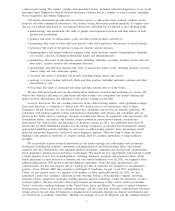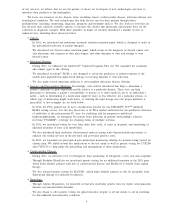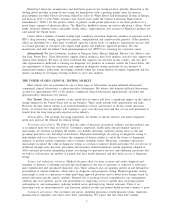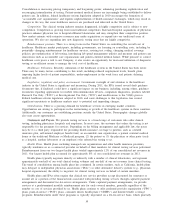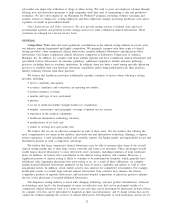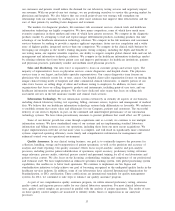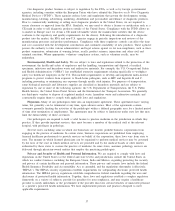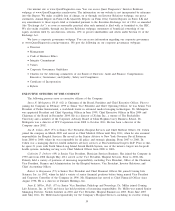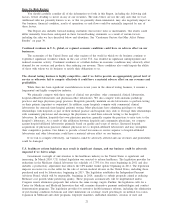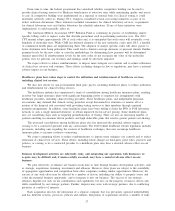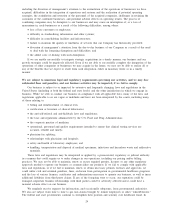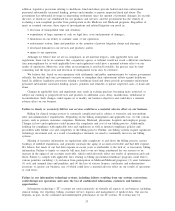Quest Diagnostics 2011 Annual Report Download - page 21
Download and view the complete annual report
Please find page 21 of the 2011 Quest Diagnostics annual report below. You can navigate through the pages in the report by either clicking on the pages listed below, or by using the keyword search tool below to find specific information within the annual report.
As an integral part of our billing compliance program, we investigate reported failures or suspected failures
to comply with federal and state healthcare reimbursement requirements. Any Medicare or Medicaid
overpayments resulting from non-compliance are reimbursed by us. As a result of these efforts, we have
periodically identified and reported overpayments, reimbursed the payers for overpayments and taken appropriate
corrective action.
We believe that most of our bad debt expense is primarily the result of missing or incorrect billing
information on requisitions and Advance Beneficiary Notices received from healthcare providers and the failure
of patients to pay the portion of the receivable that is their responsibility, rather than credit related issues.
Deteriorating economic conditions may adversely impact our bad debt expense. In general, we perform the
requested tests and report test results regardless of whether the billing information is correct or complete. We
subsequently attempt to contact the healthcare provider or patient to obtain any missing information and to rectify
incorrect billing information. Missing or incorrect information on requisitions complicates and slows down the
billing process, creates backlogs of unbilled requisitions and generally increases the aging of accounts receivable
and bad debt expense. The increased use of electronic ordering reduces the incidence of missing or incorrect
information.
Government Coverage and Reimbursements. Government payers, such as Medicare and Medicaid, have
taken steps and can be expected to continue to take steps to control the cost, utilization and delivery of
healthcare services, including clinical test services. For example, Medicare has adopted policies under which it
does not pay for many commonly ordered clinical tests unless the ordering physician has provided an appropriate
diagnosis code supporting the medical necessity of the test. Physicians are required by law to provide diagnostic
information when they order clinical tests for Medicare and Medicaid patients.
The healthcare industry has experienced significant changes in reimbursement practices during the past
several years. Historically, many different local carriers administered Medicare Part B, which covers services
provided by commercial clinical laboratories. They often had inconsistent policies, increasing the complexity of
the billing process for clinical laboratories. They are being replaced with contractors who will administer both
Part B and Medicare Part A benefits for beneficiaries in larger regional areas. It is expected that the revised
system will reduce the administrative complexity of billing for services provided to Medicare beneficiaries.
With regard to the clinical test services performed on behalf of Medicare beneficiaries, we must bill the
Medicare program directly and must accept the carrier’s fee schedule amount for covered services as payment in
full. In addition, state Medicaid programs are prohibited from paying more (and in most instances, pay
significantly less) than Medicare. Currently, Medicare does not require the beneficiary to pay a co-payment for
clinical laboratory testing reimbursed under the Clinical Laboratory Fee Schedule. Certain Medicaid programs
require Medicaid recipients to pay co-payment amounts for clinical laboratory testing. Medicare patients generally
are required to make co-payments for anatomic pathology services.
Part B of the Medicare program contains fee schedule payment methodologies for clinical testing services,
and for pathology and other physician services, performed for covered patients, including a national ceiling on
the amount that carriers could pay under their local Medicare clinical testing fee schedules. The Medicare
Clinical Laboratory Fee Schedule for 2012 is increased by 0.65% from 2011 levels. In December 2011, Congress
delayed by two months a potential 27.4% decrease in the physician fee schedule that otherwise would have
become effective January 1, 2012. The following table sets forth the percentage of our consolidated net revenues
reimbursed under Medicare attributable to the clinical testing and physician fee schedules in 2011.
Medicare Part B
Reimbursements
% of our
2011 Consolidated
Net Revenues
Clinical Laboratory Fee Schedule ................................................... 12%
Physician Fee Schedule............................................................. 3%
Penalties for violations of laws relating to billing government healthcare programs and for violations of
federal and state fraud and abuse laws include: (1) exclusion from participation in Medicare/Medicaid programs;
(2) asset forfeitures; (3) civil and criminal fines and penalties; and (4) the loss of various licenses, certificates
and authorizations necessary to operate our business. Civil monetary penalties for a wide range of violations may
be assessed on a per violation basis. A parallel civil remedy under the federal False Claims Act provides for
penalties on a per violation basis, plus damages of up to three times the amount claimed.
Historically, most Medicare and Medicaid beneficiaries were covered under the traditional Medicare and
Medicaid programs administered by the federal government. Over the last several years, the federal government
has continued to expand its contracts with private health insurance plans for Medicare beneficiaries and has
encouraged such beneficiaries to switch from the traditional programs to the private programs, called “Medicare
15


